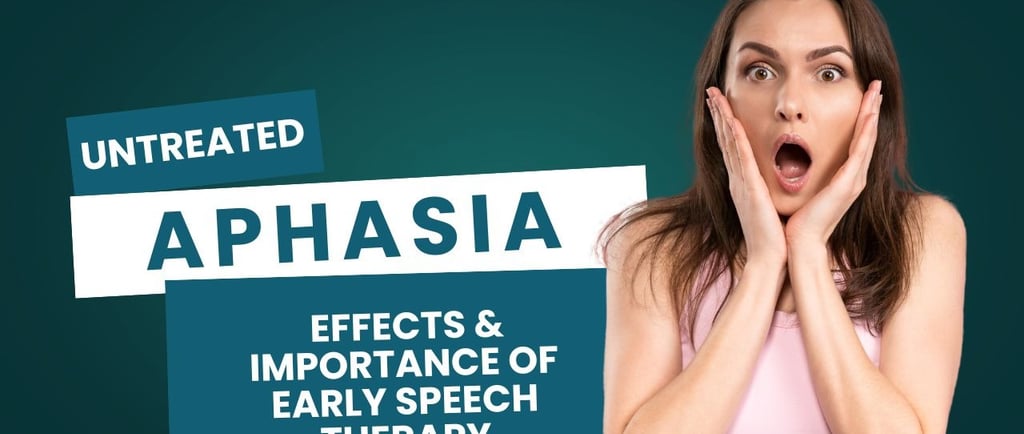Online Speech Therapy Platform
Untreated Aphasia: Effects & Importance of Early Speech Therapy
Learn how untreated aphasia impacts communication, emotions, and quality of life. Discover why early intervention through speech therapy is essential for recovery.
APHASIA
Selvakumar
7/11/20252 min read


✨ Introduction
Aphasia is a communication disorder that often occurs after a stroke or brain injury, affecting a person’s ability to speak, understand, read, or write. While many people associate aphasia with just speech difficulties, the impact runs deeper. Left untreated, aphasia can significantly affect emotional well-being, independence, and social relationships. The good news? Early and consistent speech therapy can greatly improve recovery outcomes.
⚠️ What Happens When Aphasia Is Left Untreated?
When aphasia is not addressed early, the brain has less opportunity to rewire and recover language abilities. Some of the long-term effects of untreated aphasia include:
1. 🧠 Cognitive Decline
Without stimulation and language engagement, people with aphasia may experience a decline in memory, attention, and executive functioning. The brain thrives on activity — and without therapy, these areas weaken over time.
2. 💬 Communication Breakdown
Simple daily conversations become frustrating or impossible. People may struggle to express needs, ask for help, or engage in social interactions. This often leads to withdrawal and isolation.
3. 😔 Emotional Distress
Living with untreated aphasia can lead to anxiety, depression, and low self-esteem. The inability to express thoughts and emotions causes frustration and a sense of being “locked in.”
4. 🧍♂️ Social Isolation
Relationships may suffer when communication is limited. Friends, family, or coworkers may not understand how to support someone with aphasia, leading to feelings of loneliness and disconnection.
5. 🚫 Loss of Independence
Tasks like managing money, attending appointments, or participating in hobbies become difficult. Without support, many individuals lose confidence in managing day-to-day activities.
✅ Why Early Intervention Matters
Starting speech therapy early — ideally within weeks of the brain injury or diagnosis — can maximize recovery potential. Here's why:
🧠 Neuroplasticity: The brain is most adaptable shortly after injury. Early therapy taps into this window of recovery.
🔄 Rebuilding Skills: Therapy helps retrain the brain to improve language, comprehension, and communication strategies.
🤝 Emotional Support: Early treatment includes counseling and education to reduce fear and empower families.
📱 Access to Tools: Modern platforms like TelloMeet offer online speech therapy using gamified tools, real-time feedback, and convenient scheduling to support early recovery from anywhere.
💡 How TelloMeet Supports Aphasia Recovery
TelloMeet is a futuristic online speech therapy platform that brings expert care to your home. With personalized therapy plans, engaging tech-based exercises, and therapist reports after each session, we’re redefining how aphasia care is delivered.
🗣️ Final Thoughts
Aphasia is more than a speech disorder — it’s a life-altering condition. But with the right support at the right time, recovery is possible. Don’t wait. Early intervention is key to restoring confidence, communication, and quality of life.
📞 Ready to Start Therapy?
Connect with a licensed speech therapist on Tellomeet.com today. Book your free consultation and take the first step toward communication recovery.
